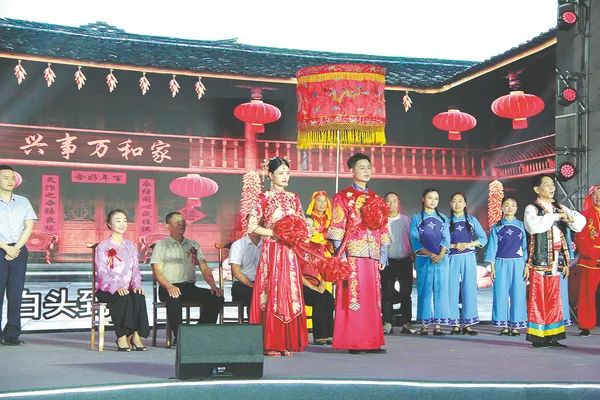Log onto a WeChat mini-program called the Digital Bayu Farming Culture Map and you can find information about over 1,000 local agricultural heritage spots in Chongqing and their associated tourist services.
The digital map, launched in mid-August, is the first of its kind in the country as China makes efforts to vitalize its farming culture.
▲ A drama showcasing the local wedding culture is staged at the launch ceremony of the Digital Bayu Farming Culture Map in Fengdu county, Chongqing, on Aug 15. Chen Yong/For China Daily
Ba and Yu are the historical names of Chongqing, a mountainous municipality in southwestern China with 32 million people.Developed by the Ministry of Agriculture and Rural Affairs, the Chongqing Agriculture and Rural Affairs Committee and the Fengdu County Agriculture and Rural Affairs Committee, the mini-program aims to make full use of local farming culture, promote agricultural development and create more jobs for farmers.Farming culture is centered on agricultural production, including farming, agricultural tools, agronomy and agricultural customs."The source of traditional Chinese culture lies in the countryside. Farming culture is an important component of that," Tang Ke, director of the rural social affairs promotion department at the Ministry of Agriculture and Rural Affairs, said at the launch ceremony for the map in Fengdu on Aug 15."The prosperity and development of rural culture cannot be achieved without the exploration and use of traditional farming culture."China was one of the first regions in the world to begin agricultural production. The profound impact of its development shaped lifestyles, values and social structure, becoming an important component of Chinese civilization.
▲ A dance show featuring farming scenes is staged in Fengdu county, Chongqing, on Aug 15. Chen Yong/For China Daily
China is a large agricultural producer, consumer and trader, feeding 20 percent of the world's population with less than 9 percent of the world's arable land, according to the Ministry of Agriculture and Rural Affairs.In March, the ministry and the Chinese Federation of Literary and Art Circles jointly issued a work plan, Colorful Earth — National Rural Cultural Vitalization in Action, to promote farming culture in different ways."The work plan has received positive responses from different regions," Tang says. "So far, 39 key national activities have been successively carried out, and 28 provinces, regions and municipalities, such as Chongqing, have formulated local implementation plans around distinctive rural cultural activities."The digital map is an important part of the work plan as Chongqing and Tianjin municipalities, as well as the Ningxia Hui autonomous region, all participated in the pilot program, he adds."We hope to develop a rural cultural map to accurately identify the location of cultural heritage, specialty foods, rural guesthouses, folk festivals, sports events, and more. By gathering this information, we aim to create a rural cultural guide service for the public that is accessible, tangible and practical," the director says.In recent years, Chongqing, which lies on the upper reaches of the Yangtze River, has invested in the protection, passing on, development and use of agricultural heritage. So far, the city has located nearly 1,000 instances, such as the Sichuan peppercorn cultivation system in Jiangjin district, the Chinese gold-thread production system in Shizhu Tujia autonomous county and the red tangerine cultivation system of Wanzhou district."Fengdu is a traditional agricultural county. Agriculture is the root and soul of our rural culture, as well as an invaluable asset," says Zhang Guozhong, the county's Party chief."Focusing on our main products of beef cattle, chicken and pickled vegetables, we are planning to develop a new agriculture model by promoting sightseeing, farming experiences and field study tours."He says over 2,000 years ago the ancestors of the Ba people settled in Fengdu, which means "the land is abundant in water and grass" on the banks of the Yangtze River.It boasts traditional music, drama and dance related to farming culture, such as the stonemason chants Longkong Chuida and the Longkong Cattle Dance.











